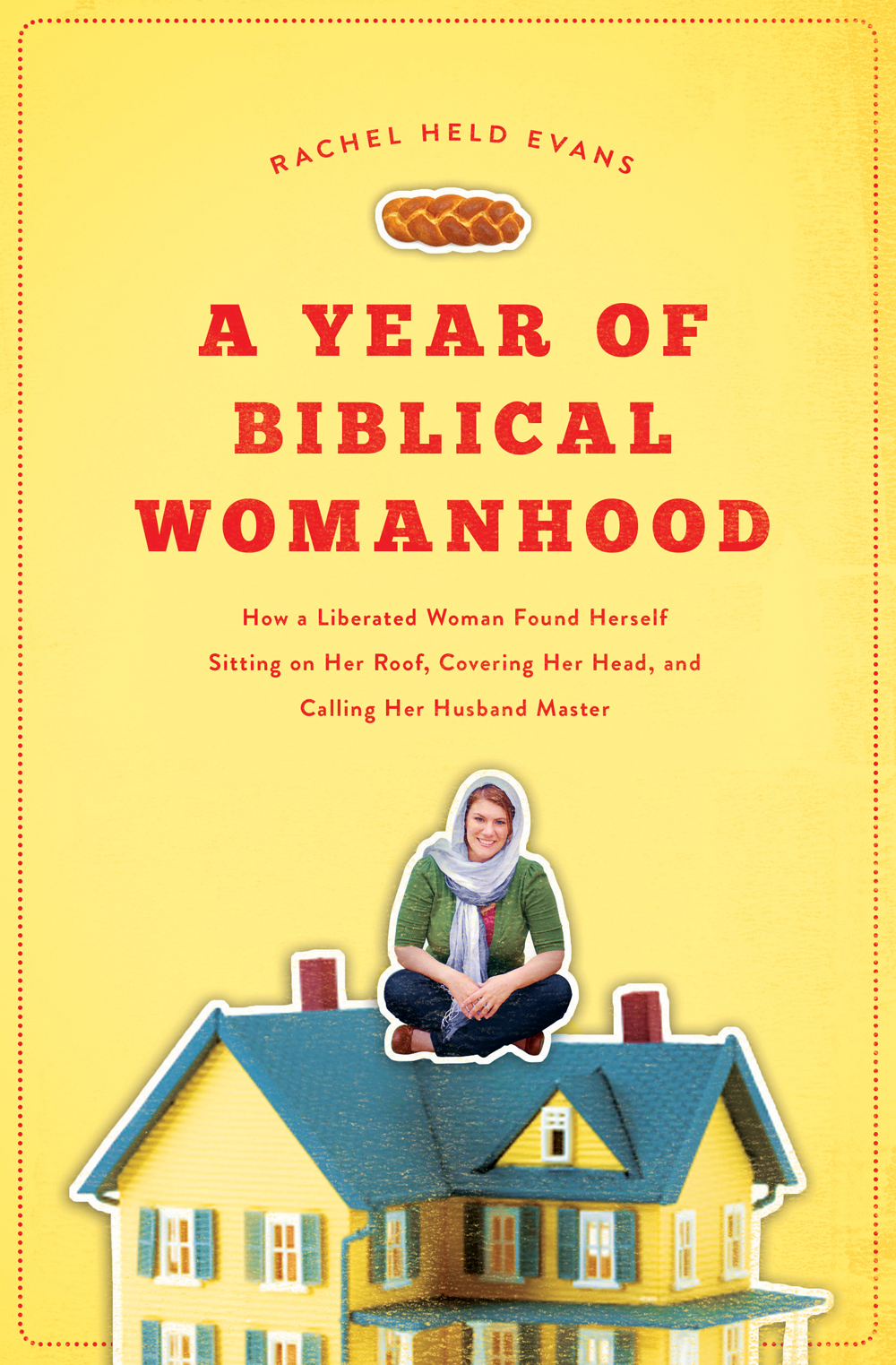 Thanks to everyone who participated in our virtual book club for April (which I introduced here). April’s selection was The Year of Biblical Womanhood by Rachel Held Evans.
Thanks to everyone who participated in our virtual book club for April (which I introduced here). April’s selection was The Year of Biblical Womanhood by Rachel Held Evans.
I’ll throw out some discussion topics, and you can post your feedback in the comments section—about these topics or about other things you’d like to talk about.
Discussion #1: Nailing the Issues
In my estimation, this book’s greatest strength is that it hits on hot-button issues for Christian women and starts a much-needed conversation. As I flipped to the table of contents, I was struck by how many of the topics evoked visceral reactions in me (modesty, submission, purity, fertility). I don’t think I’m alone in this—these are charged issues for many women because some churches have a history of coming down hard and graceless in these areas. I appreciate that this book encourages us to be intentional as we contemplate what biblical womanhood really looks like—what’s culture, what’s tradition, and what’s truly biblical.
We dishonor the original intent and purpose of the Epistles when we assume they were written in a vacuum.” (p. 260)
Throughout these pages, Rachel extends an invitation to the Church to allow God to be creative in the way he gifts and equips women. She says that women can follow God in ways that look different for each person and encourages us to make use of our gifts, even the ones that aren’t traditionally seen as “feminine.”
The Bible does not present us with a single model for womanhood, and the notion that it contains a sort of one-size-fits-all formula for how to be a woman of faith is a myth.” (p. 295)
Are any of the topics addressed in this book hot-button issues for you? How do you feel the Church has handled these topics—both historically and now?
Discussion #2: Entertainment Value
I’m a sucker for books about people who sign up to make their everyday lives an experiment, so I enjoyed Rachel’s premise. I appreciated her sense of humor in her retelling of events—especially her Martha Stewart cooking adventures, her backyard camping trip, and her introduction to parenting with Baby Chip.
What did you think of Rachel’s experiment? Would you ever embark on a similar journey?
Discussion #3: A “Slap-Bang” Approach
Having read my share of A. J. Jacobs, I was hoping Rachel would really dive in and explore biblical womanhood. Some of her experiments felt gimmicky and halfhearted—something of a “slap-bang” approach, to borrow her mom’s phrase.
On a related note, I would have liked to see more nuanced arguments to engage a conservative perspective. I usually agreed with her nuggets of wisdom at the end of each chapter, but it felt like she set up straw men at the opposite extreme (polygamists, misogynists, the Amish) without exploring what a more balanced approach might look like. Her claims stemmed from a pragmatic starting point (what worked for her), not from a biblical standpoint. For example, this is where she lands in the submission chapter:
Life happened, and Dan and I quickly realized that we functioned best as a team of equal partners.” (p. 204)
It feels too easy to me to brush off parts of the Bible because they don’t “work.” After all, carrying your cross doesn’t seem like a particularly practical premise to build a religion on. How do you distinguish what scriptural teachings are unchanging standards and which ones are relevant only for a particular cultural context?
Discussion #4: The Highlight
My favorite chapter is the one on valor. Rachel offers authentic, credible insights into Proverbs 31 that I found freeing and life giving.
Eschet chayil [woman of valor] is at its core a blessing—one that was never meant to be earned, but to be given, unconditionally.” (p. 88)
See my post here for more thoughts on women of valor.
Did you have a favorite part of the book or something that particularly resonated with you?
Rating: ★ ★ ★
I commend Rachel for bringing these tough topics to the forefront of conversation among Christian women, and for that I say to her, “Eschet chayil!” Even so, I would have liked to see a more balanced, wholehearted approach. I would give this book 3 stars.
What rating would you give this book?
{Remember: I’ll send a free book to one randomly selected commenter!}

Stephanie, I really appreciated your summation of the book, as I had much the same reaction. She is a gifted writer, and I enjoyed reading it all the way through. At the same time, I chafed at the experimental gimmicks ( they were fun to read about but annoying in many ways). I would give it 3 stars as well, but recommend it for lively group discussions.
Thanks, Maggie! It definitely sparked a lot of good discussion. I like your word: “lively.”
I finally finished it and although I didn’t think I would I enjoyed the book a lot. She had a fun humor and way of “testing” the biblical womanhood and began with a narrow view each chapter and ended up with a broad conclusion. I liked that she used extreme examples for her experiments into womanhood. But I didn’t alway see the biblical part. I was impressed by her husband, Dan, he put up with a lot of stuff. The final message to me was that we cannot take one piece of the bible and “ignore” the rest. It is one story of God’s love and we, men and women alike, are just the unworthy recipients and we should all reflect His love and glory in our lives. Great idea, Stephaine, I will give it 4 stars.
Thanks for your thoughts, Nancy! I agree about her husband…he was a good sport, and I enjoyed reading his journal entries.